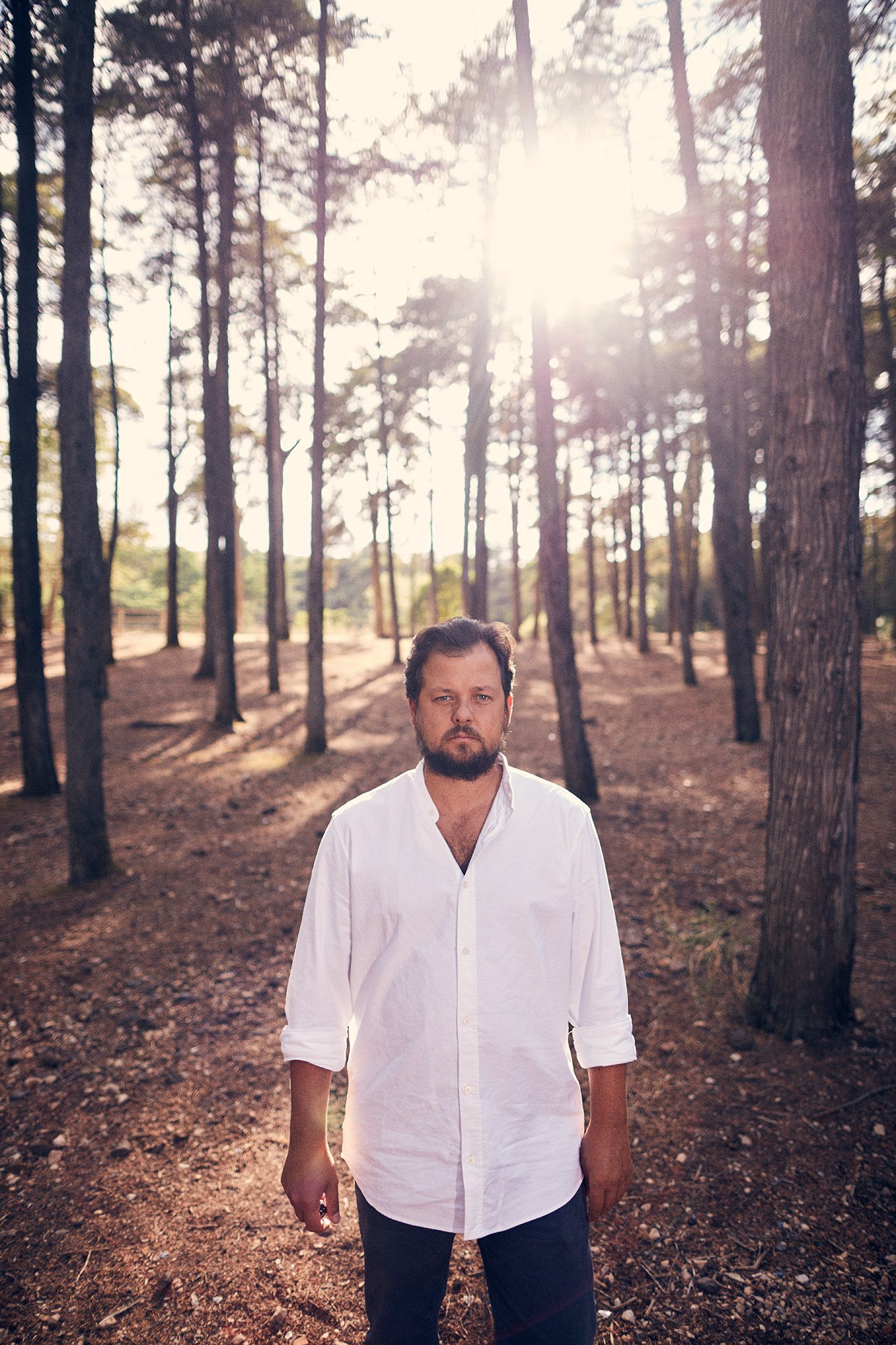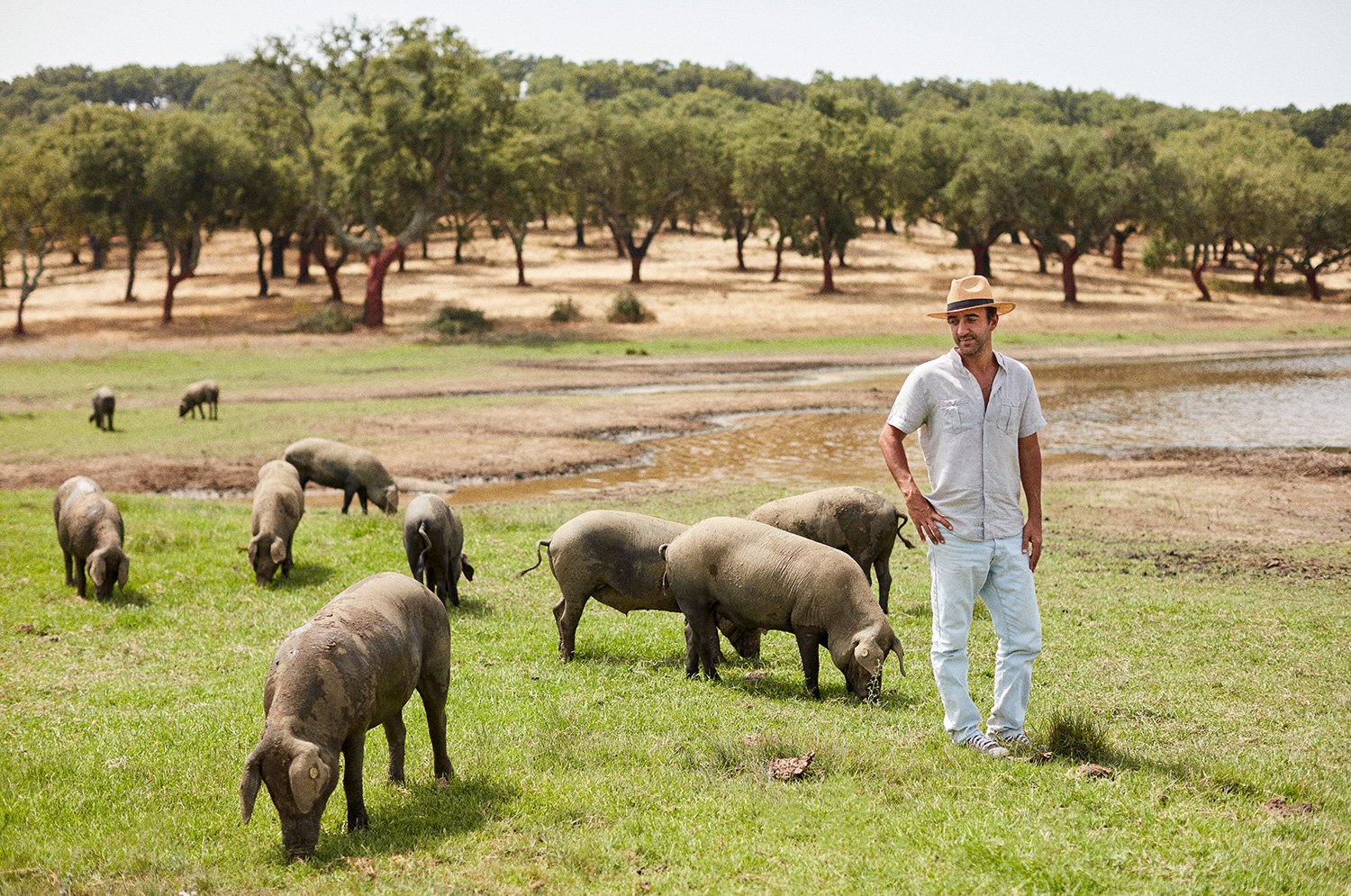Material World
DIOGO LOPES
Words
VASCO CÉLIO
Photography
Chef João Rodrigues
IN 2015, RODRIGUES FELT HE NEEDED TO BETTER DEFINE THE IDENTITY OF THE PORTUGUESE PRODUCE HE USED IN HIS DISHES.
Two years after taking charge of Feitoria, the Michelin-starred restaurant housed in the Altis Belém Hotel & Spa, chef João Rodrigues decided to kickstart what many would describe as one of the most important Portuguese food initiatives, Projeto Matéria. In 2015, Rodrigues felt he needed to better define the identity of the Portuguese produce he used in his dishes. “We were looking for our own language and wanted it, to some degree, to reflect our traditions. We believe that, for a country or city that gets a lot of visitors, it’s crucial that these people get the chance to discover our gastronomy and what sets us apart”, he says. And so, the quest for the finest Portuguese produce began.
The first hurdle was the lack of information. “I began by connecting different people throughout the country, mainly cooks, trying to find out what producers existed in their area.” The focus was small, enthusiastic producers, working ethically while offering high-quality products that are as natural as possible. They should also use traditional methods and, ideally, be relatively unknown.
Responses were encouraging. Now began the most interesting, as well as slowest and most difficult part. Rodrigues had to go and see with his own eyes. He had to taste, delve into origins, processes, separating the wheat from chaff. Above all, he had to meet the people involved.
Rodrigues and his wife, Vânia, rolled up their sleeves and hit the road, often spending their own money and what little free time they had. This mission meant finding “people who did things for the love of it, but who were amazing”, and discovering weird and wonderful species they’d never seen. After talking to farmers and breeders, they realised how tough the life sometimes was. “We would hear that farming was the art of slowly becoming poor”, recalls Rodrigues, who felt that many of these people had been forgotten and left at the mercy of big business. Such a relationship often decimated profit margins and limited their way of working, as they found themselves increasingly held hostage by markets that had no idea how important their work was.
The list got longer with every road trip. “We decided to transform what we were doing for Feitoria into something more comprehensive and useful for everyone”, he says. This involved creating a digital platform to bring producers together, while introducing them to a wider public, both food professionals and regular consumers. This introduc-tion includes all the relevant information: products and locations, as well as contacts to encourage a direct relationship between consumers and producers. The result is Projeto Matéria.
Many things have changed since those baby steps. For example, 80% to 90% of the Feitoria menu is made up of Portuguese produce. The restaurant is now “in direct contact with the vast majority of producers, keeping pace with the seasons and reducing waste”.
Rodrigues realised that the produce he encountered was an extension of those who made it. “Matéria has become about people and not produce. Above all, it’s a way of creating knowledge about people”.
These men and women also have an important social impact. Although many of them live in deserted areas of Portugal this doesn’t deter them. “They become guardians of the land, keeping it alive and healthy, while inspiring people to discover the interior”, highlights Rodrigues. One of his and Vânia’s great hopes is that, by amassing and creating information about these defenders of nature and tradition, Matéria will repay them the true value of their work. This involves consumers understanding the importance and quality of what they produce, thus helping them “charge fairer prices than those often demanded of them”.
Now, six years later, João Rodrigues estimates that it took 170 trips to bring together the 80 producers featured in Matéria. Other people’s input has also bolstered the list. Nowadays, guided as ever by their original criteria, they can hardly keep up with the suggestions they receive.
Matéria continues digitally and physically through the “One day” events, where the public is invited to meet a producer and enjoy a meal. In the future, this idea may even have a fixed physical address. One thing is certain: Projeto Matéria seems to have no end in sight.
NEPTUN PEARL
IN SEARCH OF PORTUGUESE OYSTERS
Célia Rodrigues is head of Neptun Pearl, an integrated aquaculture company that took root on the banks of the Sado River, in the city of Setúbal.
Born in Peniche, a well-known Portuguese fishing town, she was born with saltwater in her veins, coming from a family of “fishermen and fishmongers”. She continues the tradition but in a different way. “They caught fish, I breed them”, explaining how she got started in aquaculture, after an impressive academic career in animal husbandry techniques and agricultural engineering. She now dedicates all her efforts to restoring stocks and breeding the Portuguese oyster species crassostrea angulata.
She moved to Setúbal 23 years ago “to set up a fish hatchery” but it was oysters that became her passion. Today, she breeds them sustainably and sells them to top chefs and regular consumers, as well as exporting them to countries like Belgium and Norway.
Her work started on the Mira River, in the Alentejo, which is one of Europe’s least polluted rivers and where she first encountered “pure and clean” oysters. Impressed with their quality, she transported the mollusc to the Sado estuary, where she now breeds them via a non-intensive, integrated production system.
CUCUMBI
HAPPY CHICKENS
Here, in the village of Barracão, in Alcácer do Sal, this producer takes the idea of happy free-range hens very seriously.
In 2017, Catarina and Tozé Francês bought the 110 hectares of land that belonged to Catarina’s father and decided to keep his 20-year-old investment going. “The farmstead had been using organic production methods for two decades,” says Tozé. Their main objective was agricultural, but when they realised that “it wasn’t profitable on its own” they set up a rural tourism business that dovetailed with the farming.
Although the project is called ‘Cucumbi’, the name of the river in Angola where Tozé played as a child, the focus has been on chickens, especially restoring endangered native Portuguese breeds, such as Preta, Amarela, Branca and Pedrês. They quickly realised that the future was in sustainable chicken rearing and egg production.
They now have over 1,200 birds that roam freely over their four hectares. “We open the doors at seven in the morning and off they go”, he says, referring to the chicken coops. These custom-built structures offer special insulation to ensure temperatures remain stable from winter to summer, not to mention the classical music that is supposed to relax the animals. “There are studies on this”, Tozé assures us.
PORCUS NATURA
CLEAN PIGGIES
Herdade de São Luís, on the outskirts of Montemor-o-Novo, doesn’t smell bad. “People associate pig farming with unpleasant odours, but there’s none of that here”, declares Francisco Alves, and rightly so. Why? The answer can be found in the work his father began, and which Francisco has continued.
The farm’s 700 hectares are home to Porcus Natura, an Alentejo pig breeding project that employs regenerative agriculture. This definition may sound strange, but it’s self-explanatory: everything is done holistically and according to the land’s natural cycles.
The animals roam free and are never crowded together. This means no concentration of animal waste and no bad smell.
Although pigs are Francisco’s main concern, his cattle are also an important part of what he describes as “an extensive regenerative management system”. All the species here contribute to productivity, ensuring the land has quality pasture and works as a carbon sink, offsetting animal emissions. This sustainable cycle produces top-quality pork and traditional charcuterie under the Absoluto brand created by Francisco.
LOVERICE
FROM BOMBA
TO RONALDO
“They called it Ronaldo, but it’s got nothing to do with the player. He hadn’t even been born then!” José Mota Capitão is talking light-heartedly about one of the rice varieties he plants at Herdade do Portocarro, on the outskirts of Grândola. “I’ve been producing rice since 1991”, says this “doctor’s son, raised in Lisbon”, who turned his back on the family profession to dedicate his life to agriculture 30 years ago.
He recounts spending 25 years producing rice and selling it “to industrial buyers, with no added value to speak of”. One day, he decided to shake things up. He knew his was “an extraordinary product”, which made him concentrate on quality rather than quantity. And so, the Loverice brand was born, which is based on three rice varieties - Ronaldo, Bomba and Centauro - produced with no “environmentally harmful products”.
What makes this project different is attention to detail: the whole process of drying and de-husking the rice is done in-house. All this care ensures that the rice maintains its flavour and texture.
A CERQUINHA
WHEN WE WANT ANIMALS,
BUT LIFE GIVES US
VEGETABLES
Fruit, vegetables and legumes were not exactly part of Rita Pacheco’s life plan, but life is anything but predictable. “I studied animal husbandry engineering because I always wanted to work with animals”, she says. However, after finishing her course, she did an internship on a farm with plants, which inspired a surprisingly avid interest. In 2016, she returned to her native Grândola to breathe new life into a property that had once belonged to her grandfather. And that’s how the organic fruit and vegetable producer, A Cerquinha, was born.
“The land was available, and we already had five hectares certified as organic. After 15 years of little use (“a few sheep grazed on it, nothing else”), it gradually became home to lettuces, spider mustard, rocket, leeks, some herbs, carrots, tomatoes and much more.
The production methods used respect the land and its cycles, ensuring, as much as possible, the seasonality of the species planted. A Cerquinha’s produce is essentially sold through seasonal hampers, which it sells directly to the consumer. Other customers include restaurants and chefs, who appreciate this type of produce, which is both environmentally and palate friendly.







